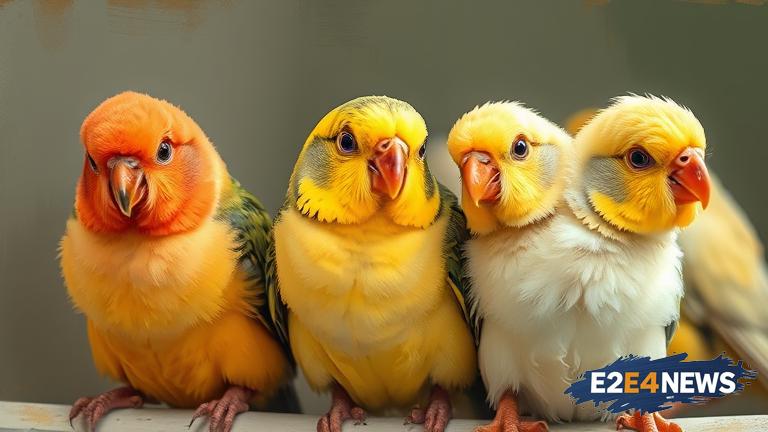As the breeding season for birds commences, animal protection associations are warning enthusiasts and novice bird owners to be aware of common mistakes that can have detrimental effects on the health and well-being of young birds. One of the primary concerns is the lack of proper nutrition, as young birds require a diet rich in essential nutrients for growth and development. A balanced diet that includes a variety of foods such as seeds, fruits, and insects is crucial for the healthy development of young birds. Furthermore, the importance of providing a clean and hygienic environment cannot be overstated, as young birds are highly susceptible to diseases and parasites. Regular cleaning of aviaries and cages, as well as the provision of fresh water and food, is essential for maintaining a healthy environment. Socialization is also a critical aspect of young bird care, as birds that are not properly socialized may develop behavioral problems and become aggressive or fearful. Handling young birds gently and carefully, as well as providing them with plenty of opportunities for exercise and play, can help to promote healthy socialization. Additionally, animal protection associations are warning against the practice of keeping young birds in small or cramped cages, as this can lead to a range of health problems, including respiratory issues and feather plucking. Providing young birds with plenty of space to fly, stretch, and exercise is essential for their physical and mental well-being. Another common mistake that bird owners make is failing to provide young birds with adequate veterinary care, including regular check-ups and vaccinations. This can leave young birds vulnerable to diseases and illnesses, which can have serious consequences for their health and well-being. In addition to these concerns, animal protection associations are also warning against the practice of releasing non-native bird species into the wild, as this can have devastating effects on local ecosystems. The release of non-native species can lead to the displacement of native species, as well as the introduction of diseases and parasites that can have serious consequences for local wildlife. To avoid these mistakes, bird owners are advised to seek guidance from experienced breeders and veterinarians, as well as to conduct thorough research on the specific needs and requirements of their birds. By taking a responsible and informed approach to young bird care, enthusiasts can help to promote the health and well-being of their birds, while also contributing to the conservation of bird populations and the protection of local ecosystems. The animal protection association is urging bird owners to prioritize the welfare of their birds, and to take a proactive approach to addressing the common mistakes that can have negative consequences for young birds. By working together, bird enthusiasts and animal protection associations can help to promote a culture of responsible and compassionate bird ownership, and to ensure that young birds receive the care and attention they need to thrive. The association is also emphasizing the importance of education and awareness, and is encouraging bird owners to share their knowledge and experience with others in order to promote best practices in young bird care. Overall, the care of young birds requires a deep understanding of their needs and requirements, as well as a commitment to providing them with the highest level of care and attention. By avoiding common mistakes and prioritizing the welfare of their birds, enthusiasts can help to promote the health and well-being of young birds, and to contribute to the conservation of bird populations. The animal protection association is committed to promoting responsible and compassionate bird ownership, and is working to educate bird owners about the importance of proper care and attention for young birds. With the right approach and a commitment to providing the highest level of care, bird enthusiasts can help to ensure that young birds receive the care and attention they need to thrive. The association is urging bird owners to take a proactive approach to addressing the common mistakes that can have negative consequences for young birds, and to prioritize the welfare of their birds above all else. By doing so, bird enthusiasts can help to promote a culture of responsible and compassionate bird ownership, and to ensure that young birds receive the care and attention they need to thrive.





